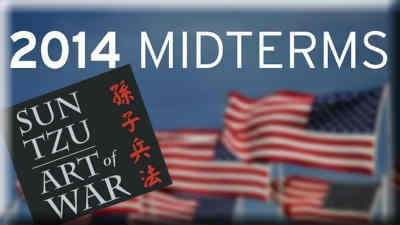By Jim ONeill ——Bio and Archives--November 3, 2014
American Politics, News | CFP Comments | Reader Friendly | Subscribe | Email Us

All warfare is based on deception. Hence, when we are able to attack, we must seem unable; when using our forces, we must appear inactive; when we are near, we must make the enemy believe we are far away; when far away, we must make him believe we are near. If your enemy is secure at all points, be prepared for him. If he is in superior strength, evade him. If your opponent is temperamental, seek to irritate him. Pretend to be weak, that he may grow arrogant. If he is taking his ease, give him no rest. If his forces are united, separate them. If sovereign and subject are in accord, put division between them. Attack him where he is unprepared, appear where you are not expected. What is essential in war is victory, not prolonged operations. There is no instance of a nation benefitting from prolonged warfare. It is said that if you know your enemies and know yourself, you will not be imperiled in a hundred battles; if you do not know your enemies but do know yourself, you will win one and lose one; if you do not know your enemies nor yourself, you will be imperiled in every single battle. [Other considerations such as tactics, strategy, logistics, etc. must of course be taken into account, but nonetheless I feel that Sun Tzu’s advice here is of prime importance]. Victorious warriors win first and then go to war, while defeated warriors go to war first and then seek to win. Be extremely subtle, even to the point of formlessness. Be extremely mysterious, even to the point of soundlessness. Thereby you can be the director of the opponent's fate. The ultimate in disposing one's troops is to be without ascertainable shape. Then the most penetrating spies cannot pry in nor can the wise lay plans against you. And therefore those skilled in war bring the enemy to the field of battle and are not brought there by him. When the enemy is at ease, be able to weary him; when well fed, to starve him; when at rest, to make him move. Appear at places to which he must hasten; move swiftly where he does not expect you. A leader leads by example not by force. If words of command are not clear and distinct, if orders are not thoroughly understood, the general is to blame. Speed is the essence of war. Take advantage of the enemy's unpreparedness; travel by unexpected routes and strike him where he has taken no precautions. Secret operations are essential in war; upon them the army relies to make its every move. Sun Tzu “The Art of War”
View Comments
Born June 4, 1951 in Philadelphia, Pennsylvania. Served in the U.S. Navy from 1970-1974 in both UDT-21 (Underwater Demolition Team) and SEAL Team Two. Worked as a commercial diver in the waters off of Scotland, India, and the United States. Worked overseas in the Merchant Marines. While attending the University of South Florida as a journalism student in 1998 was presented with the “Carol Burnett/University of Hawaii AEJMC Research in Journalism Ethics Award,” 1st place undergraduate division. (The annual contest was set up by Carol Burnett with money she won from successfully suing a national newspaper for libel). Awarded US Army, US Navy, South African, and Russian jump wings. Graduate of NOLS (National Outdoor Leadership School, 1970). Member of Mensa, China Post #1, and lifetime member of the NRA and UDT/SEAL Association.